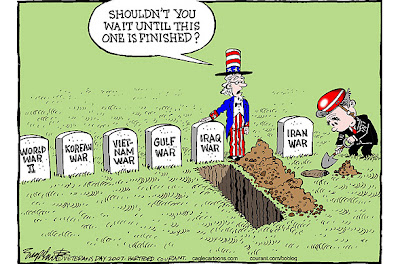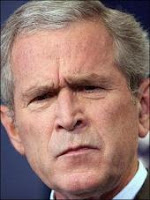
Iran news and views blog
search
Saturday, November 17, 2007
Thursday, November 15, 2007
West opposed to Iran-IAEA constructive cooperation
link
Ahmadinejad:Iran Monitoring US Military Moves in Region
Iran Starts Industrial Enrichment
Government spokesman Gholam Hossein Elham :
"We are moving on a path which leads to industrial (enrichment) technology and we want to use this technology for our nuclear power plants in a peaceful way and within the regulations," Elham said in response to the question if Iran intends to increase the number of its centrifuges to over 3,000.
source
Wednesday, November 14, 2007
Monday, November 12, 2007
Israel 's anger indicates ElBaradei’s report is positive
| Harsh attacks against the IAEA and its Director General Mohamed ElBaradei by the Zionist officials indicates that the agency’s report is in favor of Iran, said MP Heshmatollah Falahatpisheh here on Monday. | |
“This position indicates that the International Atomic Energy Agency director general’s report will be in favor of Iran,” Falahatpisheh, a member of the Majlis National Security and Foreign Policy Committee, told the Mehr News Agency. The IAEA is set to release its report to the IAEA Board of Governors on November 23 and 24. On nuclear proposals by European foreign policy chief Javier Solana and Saudi Arabian Foreign Minister Saud al Faisal, he said the security committee plans to review both proposals so to “see what their nature is.” If the plans are intended to deprive Saudi foreign minister said recently that his country and the other five members of the Persian Gulf Cooperation Council had suggested setting up a consortium, possibly based in Asked if Russian President Vladimir Putin in his recent trip to |
http://www.mehrnews.com/en
The lonesome cowboy of the Middle East
| As the crises become more acute in the Middle East and South Asia and developments rapidly change in the region, the United States is on the precipice of a major foreign policy and security crisis. | |
The critical situation in Pakistan, the uncertain future of Pervez Musharraf’s government, the rise in bombings in Afghanistan, the fact that the Turkish army is on alert on the border of northern Iraq, the dispute over the presidential election in Lebanon, and the increased tension in the occupied territories of Palestine are giving rise to a situation that will shake the position of the U.S. in the region. If instability rises in Of course, recent developments in northern This has caused problems for In Events in The increased violence in In In fact, it is the interference of the In With the situation about to spin out of control in the Clearly, if the Now many of Bush’s old associates blame him for his aggressive policies that have been implemented throughout the world and believe that the current situation is harmful to Thus, it is not surprising that Bush’s friends have dubbed him the lonesome cowboy of the |
http://www.mehrnews.com/en
Ahmadinejad: Iran should get ready for its global missions
"We should first resolve our geopolitical issues and then prepare ourselves for the next move," he said.
The enemies try to convince the world that the Islamic Republic of Iran is not capable of handling its own affairs, he said, adding that "In my belief the God Almighty will humiliate the big powers." The enemies try to create obstacles to deviate Iran from path of development and success, said the president. keep reading
Iran keen to boost ties with Africa
President Ahmadinejad told a group of ministers attending the Seminar of Iran-Africa Trade Opportunities that Iran and African states, which have abundant financial and human resources, are in today's world in need of very serious, all-out and close cooperation. keep reading
Anti-war activists do battle over intervention in Iran
An acrimonious war of words has broken out between notable luminaries within the anti-war movement after the Stop the War Coalition refused to allow a group that campaigns against military intervention in Iran to join its ranks.
The decision has prompted a number of prominent activists, including Peter Tatchell and Michael Mansfield QC, to accuse the coalition of being apologists for the Iranian government by "refusing to allow any criticism" of the Tehran regime.
Hands Off the People of Iran (Hopi), a small group of predominantly Iranian exiles who campaign for regime change in Iran but are against external military intervention, were told last month they could not be affiliated to the Stop the War Coalition after their application was rejected by a vote at the anti-war coalition's annual meeting. Members of Hopi said they have been "excommunicated" because of their vociferous opposition to the Tehran regime.
Iran Has a Right to Seek N. Technology
As if that didn't illustrate enough the tensions of the nuclear age, two Bush administration officials - United Nations Ambassador Zalmay Khalilzad and deputy State Department spokesman Tom Casey - made simultaneous remarks that illuminated the nuclear double standard more starkly than ever. keep reading
British MPs Underline Iran's N. Rights
Sunday, November 11, 2007
Mofaz’s shameful and arrogant suggestions
Since Tehran and the International Atomic Energy Agency signed a deal on August 21 to clear up the remaining questions about Iran’s nuclear activities Israel and U.S. became too angry and started leveling charges against the IAEA and its director Mohamed ElBaradei.
This angriness and impudence is becoming more and more naked as Iran and the IAEA are actually succeeding to resolve all differences one by one, especially after ElBaradei stressed in an interview with CNN on October 28 that there is no evidence that Iran is building nuclear weapons keep reading
US Will Not Win Iran War
Bush extends Iranian asset freeze
The measure was ordered by then president Jimmy Carter on November 14, 1979, 10 days after students took over the U.S. embassy in Tehran where they eventually held about 60 hostages for 444 days. The crisis led to the end of U.S.-Iranian diplomatic relations in 1980. The asset freeze, which has been renewed every year, is a source of resentment in Iran. Washington has since reinforced a sanctions regime on the Islamic Republic. The United States is also pushing for UN sanctions to punish Iran for its refusal to halt its nuclear program.source
The 5+1 Has Accepted 3.000 Centrifuges for Iran”

- Russian Foreign Affairs Minister was the last high-ranking personality who met Mr. Ahmadinejad on 30 October
- Iran had put into operation more than 3,000 centrifuges and every week we install a new series, Mr. Ahmadinejad had said last month.
Paris, 7 Nov. (IPS) The United States has sent a message to Iran, saying they are ready for talks in case Iran “stops its nuclear activities at 3.000 centrifuges“, the fanatic Iranian President Mahmoud Ahmadinejad revealed Wednesday.
“The Big Ill-humoured (the new name Ahmadinejad is bestowing to the United States) has sent a message to the Islamic Republic, saying if you stop at the level of 3.000 centrifuges, we are ready to talk (to you) “, the President told people at Birjand, the capital city of the Southern Khorasan Province, bordering with Afghanistan.
“On behalf of the Iranian people, I told those who brought the message that we had not asked anybody to talk to put conditions for us”, Mr. Ahmadinejad said. keep reading
The Iranian Challenge

- Although the ruling clergy in Iran are very unpopular, they are not going anywhere anytime soon.
- Iran often conceals its real objectives behind layers of ideological rhetoric, with the aim of confusing potential enemies
- Intrusive inspections is the best tool to ensure that Iran doesn't divert its civilian program into a military one.
Iran will be the top foreign policy challenge for the United States in the coming years. Washington’s failure to understand Iran is partly because it for a long time could afford to ignore that country – and adopt self-serving and ultimately false assumptions about Tehran.
Today, Washington can no longer afford to be in the dark about the realities of Iran. For the next President of the United States to be successful in dealing with Iran, he or she must first reassess these assumptions before a new policy can be adopted.
In the piece below, published in a special edition of The Nation Magazine, he discusses these assumptions and describes how Washington can change Iran’s behavior by modifying its own.keep reading
IRGC Commander Highlights Iran's Security
 Commander-in-chief of the Islamic Revolutionary Guards Corps (IRGC) Major General Mohammad Ali Jafari :
Commander-in-chief of the Islamic Revolutionary Guards Corps (IRGC) Major General Mohammad Ali Jafari :ad
Blog Archive
-
▼
2007
(68)
-
▼
November
(41)
- time.com cartoon of the week
- West opposed to Iran-IAEA constructive cooperation
- Ahmadinejad:Iran Monitoring US Military Moves in R...
- Iran Starts Industrial Enrichment
- cartoon
- USA soldiers in persian golf
- Israel 's anger indicates ElBaradei’s report is po...
- The lonesome cowboy of the Middle East
- Ahmadinejad: Iran should get ready for its global ...
- Iran keen to boost ties with Africa
- Anti-war activists do battle over intervention in ...
- Iran Has a Right to Seek N. Technology
- British MPs Underline Iran's N. Rights
- Mofaz’s shameful and arrogant suggestions
- US Will Not Win Iran War
- Bush extends Iranian asset freeze
- The 5+1 Has Accepted 3.000 Centrifuges for Iran”
- The Iranian Challenge
- IRGC Commander Highlights Iran's Security
- Ahmadinejad meets People
- Iranian envoy says Iran playing key role in region...
- No discord among Iranian officials on nuclear issue
- Iran will study any offer guaranteeing its nuclear...
- Ahmadinejad: Iran's N. Progress Irrevocable
- Iran's Power to Strike US Interests
- West opposes legal investigation of Iran nuclear d...
- Enemy Troops Escape after Iran's Warning
- Ahmadinejad: Iranians prepared to safeguard their ...
- Iran Decides Next US President
- Anniversary of 'Students Day' honored
- Iranian nation firm to gain its nuclear rights
- US Seeks Control over Mideast Oil under Pretext of...
- Attacking Iran Is A Really, Really Bad Idea
- Ahmadinejad Blasts Powers' Misuse of Media
- Iran is bad ,Pakistan is good
- Rafsanjani Highlights Iran's Military Achievements
- Iran warns U.S. of "quagmire" if attacked
- Attacking Iran for Israel?
- Bush Regime Targets Iran After 9/11
- Iranian graphic designer wins top Dutch award
- Iranian Supreme Leader Dismisses US Claims about Iran
-
▼
November
(41)


